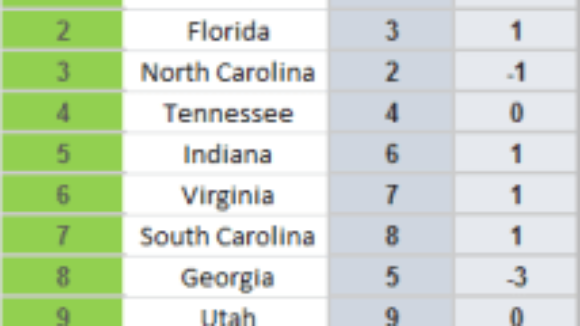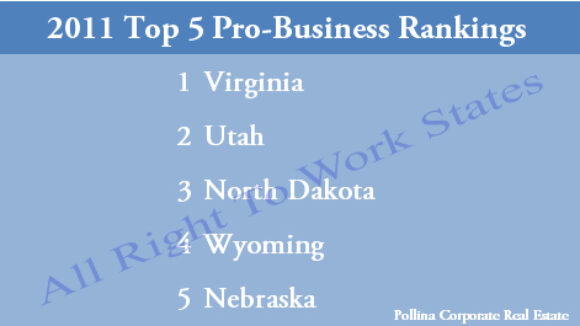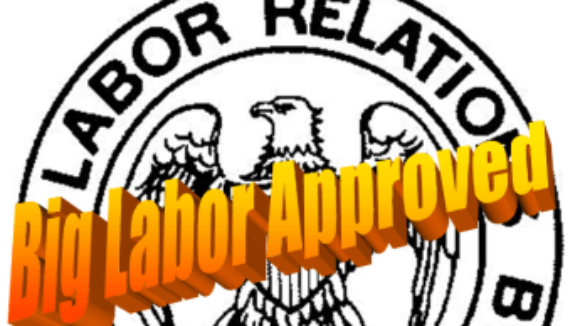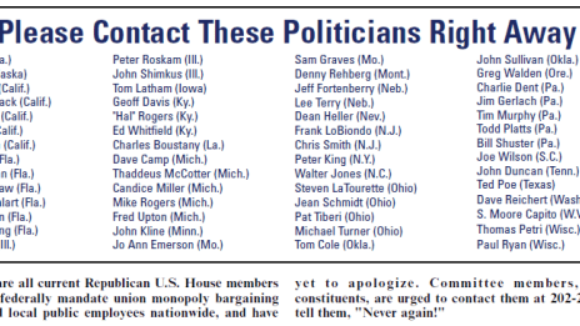The Union Label
Terry McAuliffe’s support from big labor continues to come under scrutiny from the media. The Free Beacon reports that the union bosses are spending big to see him gain control of the Old Dominion: Unions are spending hundreds of…
Terry McAuliffe’s support from big labor continues to come under scrutiny from the media. The Free Beacon reports that the union bosses are spending big to see him gain control of the Old Dominion: Unions are spending hundreds of…
CNBC’s 6th annual study of America’s Top States for Business finds, once again, that Right to Work…

If you live in the following states, Colorado, Florida, New Hampshire, Nevada, Ohio, Pennsylvania, Wisconsin and Virginia, you will have the privileged of seeing millions of dollars of forced union dues money spent to re-elect President Obama. The Service…

If you live in the following states, Colorado, Florida, New Hampshire, Nevada, Ohio, Pennsylvania, Wisconsin and Virginia, you will have the privileged of seeing millions of dollars of forced union dues money spent to re-elect President Obama. The Service…

In Chief Executive Magazine's Best and Worst States for Business, all the top ten were from Right To Wok States. Unsurprisingly, Compulsory Unionism States took all bottom ten positions. States ranking from 1-10 are: Texas, Florida, North Carolina, Tennessee, Indiana, Virginia, South Carolina, Georgia, Utah, Arizona. States ranked from the worst, 50-41: California, New York, Illinois, Massachusetts, Michigan, New Jersey, Connecticut, Pennsylvania, Oregon, Hawaii. From the Chief Executive: 2012 Best & Worst States for business. Source: Chief Executive Magazine

From the Richmond Times by NRTW President Mark Mix: Weathering an economic downturn is never easy, but some states are managing better than others. Despite the recession, Virginia boasts a modest unemployment rate, and its average hourly wages top the national mean. What's the Old Dominion's secret? One factor that sets Virginia apart from its less fortunate neighbors is the state's popular Right to Work law. Virginia's Right to Work law ensures that no employee can be forced to join or pay dues to a union just to get or keep a job. Protecting employee choice has always been the most important argument in favor of Right to Work, but Virginia's economic performance is another point for worker freedom. Recent studies from the Cato Institute and the National Institute for Labor Relations Research indicate that right-to-work states enjoy higher job growth and more disposable income (after adjusting for families' cost-of-living) than their forced-unionism counterparts. Eight of the top 11 states for wage and salary growth enjoy right-to-work protections. Meanwhile, 13 of the 14 worst performers lack right-to-work laws. Workers and their families are also voting with their feet: According to the National Institute for Labor Relations Research, the young adult population in forced-unionism states has basically stagnated since 1980. Virginia, on the other hand, continues to attract a stream of new workers and entrepreneurs. Protecting worker freedom also prepares states to handle a difficult recession better than their forced-unionism counterparts. Virginia's robust job and wage growth compares favorably with the sluggish performance of union-dominated states like Michigan, Illinois and Wisconsin.

The BNA news service reports that the attorneys general of South Carolina, Alabama, Arizona, Florida, Georgia, Nebraska, Oklahoma, Texas, and Virginia are challenging the NLRB’s overreach in its attempt to circumvent state Right to Work laws: The attorneys general…

(Source: March 2011 NRTWC Newsletter) Time For Politicians in Both Parties to Own Up to Their Mistakes In late February, many concerned Americans in other states were paying close attention to the fierce, and still unresolved, battle over public-sector union monopoly bargaining in Wisconsin. Many observing the Madison showdown from their homes inwere undoubtedly amazed by what they saw. These five states, like roughly a dozen others, have no statutes on the books empowering government union officials to act as state and local public employees' monopoly-bargaining agents. When elected officials in such states make a judgment that a reform in public-employee compensation packages and work rules is necessary and can be prudently implemented to give taxpayers a better return on their money, they have the power to proceed. It is then up to the voting public to judge whether the reform was a good idea or not. In Wisconsin, however, like in other states which statutorily mandate union monopoly bargaining over public employee pay, benefits, and working conditions, elected officials from the governor on down have far less control over the roughly 50% of public expenditures that go into employee compensation. In the Badger State, half of state and local government employees are unionized. Elected officials and their appointees cannot make any significant changes in the way these employees are compensated or in how they are instructed to do their jobs without government union bosses' approval. Today, millions of Americans whose state and local governments operate free from Big Labor constraints appreciate, after watching the bitter struggle in Wisconsin unfold, better than ever before the importance of keeping union monopolists out of the government workplace. Only Intense Right to Work Lobbying Blocked Monopoly-Bargaining Bill What most freedom-loving Virginians, North Carolinians and Texans probably don't realize is that, just last year, the U.S. Congress came within a hair of taking away their prerogative to decide how their state and local government workplaces are run. At the outset of the 2009-2010 Congress, the votes were there to pass the so-called "Public Safety Employer-Employee Cooperation Act" in both the House and the Senate. Furthermore, President Obama was publicly vowing to sign this legislation as soon as it reached his desk. This measure, more accurately labeled the "Police/Fire Monopoly-Bargaining Bill," would have foisted Wisconsin-style labor relations on state and local public-safety departments in all 50 states.

Click image to contact Gov. Walker Subscribe to The National Right to Work Committee® by Email According to Fox News’ Judson Berger, “Wisconsin Union Battle Could Set Stage for National ‘Right to Work’ Debate.” More from Berger’s article:…